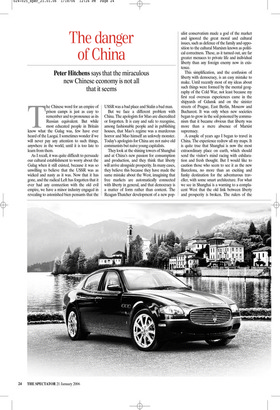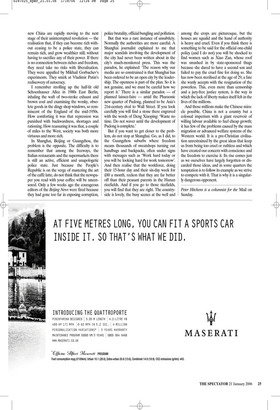The danger of China
Peter Hitchens says that the miraculous new Chinese economy is not all that it seems The Chinese word for an empire of prison camps is just as easy to remember and to pronounce as its Russian equivalent. But while most educated people in Britain know what the Gulag was, few have ever heard of the Laogai. I sometimes wonder if we will never pay any attention to such things, anywhere in the world, until it is too late to learn from them.
As I recall, it was quite difficult to persuade our cultural establishment to worry about the Gulag when it still existed, because it was so unwilling to believe that the USSR was as wicked and nasty as it was. Now that it has gone, and the radical Left has forgotten that it ever had any connection with the old evil empire, we have a minor industry engaged in revealing to astonished bien pensants that the USSR was a bad place and Stalin a bad man.
But we face a different problem with China. The apologists for Mao are discredited or forgotten. It is easy and safe to recognise, among fashionable people and in publishing houses, that Mao’s regime was a murderous horror and Mao himself an unlovely monster. Today’s apologists for China are not naive old communists but naive young capitalists.
They look at the shining towers of Shanghai and at China’s new passion for consumption and production, and they think that liberty will arrive alongside prosperity. In many cases, they believe this because they have made the same mistake about the West, imagining that free markets are automatically connected with liberty in general, and that democracy is a matter of form rather than content. The Reagan-Thatcher development of a new pop ulist conservatism made a god of the market and ignored the great moral and cultural issues, such as defence of the family and opposition to the cultural Marxism known as political correctness. These, as it turned out, are far greater menaces to private life and individual liberty than any foreign enemy now in existence.
This simplification, and the confusion of liberty with democracy, is an easy mistake to make. Until recently most of my ideas about such things were formed by the mental geography of the Cold War, not least because my first real overseas experiences came in the shipyards of Gdansk and on the sinister streets of Prague, East Berlin, Moscow and Bucharest. It was only when new societies began to grow in the soil poisoned by communism that it became obvious that liberty was more than a mere absence of Marxist supremacy.
A couple of years ago I began to travel in China. The experience redrew all my maps. It is quite true that Shanghai is now the most extraordinary place on earth, which should send the visitor’s mind racing with exhilaration and fresh thought. But I would like to caution those who seem to see it as the new Barcelona, no more than an exciting and funky destination for the adventurous traveller, with some smart architecture. For what we see in Shanghai is a warning to a complacent West that the old link between liberty and prosperity is broken. The rulers of the new China are rapidly moving to the next stage of their uninterrupted revolution — the realisation that, if they can become rich without ceasing to be a police state, they can remain rich, and grow wealthier still, without having to sacrifice any of their power. If there is no connection between riches and freedom, they need take no risks with liberalisation. They were appalled by Mikhail Gorbachev’s experiments. They smirk at Vladimir Putin’s rediscovery of autocracy.
I remember strolling up the half-lit old Schoenhauser Allee in 1980s East Berlin, inhaling the waft of two-stroke exhaust and brown coal and examining the wonky, obsolete goods in the dingy shop windows, so reminiscent of the England of the mid-1950s. How comforting it was that repression was punished with backwardness, shortages and rationing. How reassuring it was that, a couple of miles to the West, society was both more virtuous and more rich.
In Shanghai, Beijing or Guangzhou, the problem is the opposite. The difficulty is to remember that among the freeways, the Italian restaurants and the supermarkets there is still an active, efficient and unapologetic police state. Just because the People’s Republic is on the verge of mastering the art of the caffè latte, do not think that the newspaper you read with your coffee will be uncensored. Only a few weeks ago the courageous editors of the Beijing News were fired because they had gone too far in exposing corruption, police brutality, official bungling and pollution.
But that was a rare instance of unsubtlety. Normally the authorities are more careful. A Shanghai journalist explained to me that major scandals involving the development of the city had never been written about in the city’s much-monitored press. This was the paradox, he explained: ‘The reason why our media are so constrained is that Shanghai has been ordered to be an open city by the leadership. The openness is part of the plan. So it is not genuine, and we must be careful how we report it.’ There is a similar paradox — of planned laissez-faire — amid the Pharaonic new quarter of Pudong, planned to be Asia’s 21st-century rival to Wall Street. If you look carefully you will find a stone there engraved with the words of Deng Xiaoping: ‘Waste no time. Do not waver until the development of Pudong is complete.’ But if you want to get closer to the problem, do not stop at Shanghai. Go, as I did, to the Guangzhou suburbs where freedom means thousands of sweatshops turning out handbags and backpacks, often under signs with messages such as ‘Work hard today or you will be looking hard for work tomorrow’. And then realise that the workforce, doing their 15-hour day and their six-day week for £80 a month, reckon that they are far better off than their peasant parents in the Hunan ricefields. And if you go to those ricefields, you will find that they are right. The countryside is lovely, the busy scenes at the well and among the crops are picturesque, but the houses are squalid and the hand of authority is heavy and cruel. Even if you think there is something to be said for the official one-child policy (and I do not) you will be shocked to find women such as Xiao Zan, whose roof was smashed in by state-sponsored thugs because she dared to have a second son and failed to pay the cruel fine for doing so. She has now been sterilised at the age of 29, a fate she wanly accepts with the resignation of the powerless. This, even more than censorship and a jury-free justice system, is the way in which the lack of liberty makes itself felt in the lives of the millions.
And those millions make the Chinese miracle possible. China is not a country but a colossal imperium with a giant reservoir of willing labour available to fuel cheap growth; it has few of the problems caused by the mass migration or advanced welfare systems of the Western world. It is a pre-Christian civilisation unrestrained by the great ideas that keep us from being too cruel or ruthless and which have created our concern with conscience and the freedom to exercise it. Its rise comes just as we ourselves have largely forgotten or discarded those ideas, and in some quarters the temptation is to follow its example as we strive to compete with it. That is why it is a singularly dangerous opponent.




















































 Previous page
Previous page